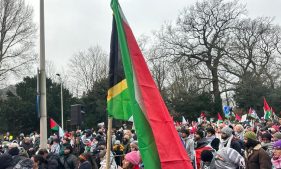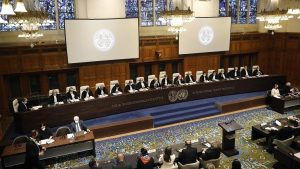The International Court of Justice (ICJ) is set to hand down a preliminary ruling tomorrow on a request from South Africa that Israel immediately suspend its military operations in Gaza. The petition to the Court for provisional measures in a case that alleges that Israel’s military actions in Gaza, that started after the Hamas massacre of Israeli civilians on October 7th, amounted to acts of genocide as stipulated in the 1948 Convention on the Prevention of the Crime of Genocide.
South Africa is asking the Hague-based Court to grant interim injunctions that could fundamentally shift the character of Israel’s devastating offensive in Gaza.
It is statements like these from the highest echelons of the United Nations that, in part, set the ICJ case in motion, this from Secretary General Antonio Guterres during a Security Council meeting earlier this week almost two weeks after South Africa led arguments in the Hague.
“The entire population of Gaza is enduring destruction at a scale and speed without parallel in recent history. Nothing can justify the collective punishment of the Palestinian people. With winter bearing down, 2.2 million Palestinians in Gaza face inhumane, squalid conditions, struggling to simply make it through another day without proper shelter, heating, sanitary facilities, food and drinking water. Everyone in Gaza is hungry, with a quarter of Gaza’s population, more than half a million people, grappling with catastrophic levels of food insecurity.”
While the broader claim of Israel’s obligations under the 1948 treaty are ventilated, South Africa is asking the Court to grant interim orders including that Israel take reasonable measures to prevent the genocide of Palestinians, ensure that the displaced are able to return to their homes and have access to humanitarian assistance while taking the necessary steps to punish those involved in the alleged genocide.
Pretoria’s legal team has also called for the preservation of evidence to Israel’s military activities in Gaza. Article 2 of the 1948 Convention refers to genocide as acts committed with the intent to destroy, in whole or in part, a national, ethnic, racial or religious group but killing members of the group, causing serious bodily or mental harm to members of the said group, deliberately inflicting conditions of life calculated to bring about the group’s physical destruction, imposing measures to prevent births within the group and forcibly transferring children of the group to another group.
As the 17 judges of the UN Court weigh the accusations and Israel’s unambiguous rejection thereof.
“The ICJ has discretion into what kind of provisional measures it imposes. It does not necessarily have to follow those precisely asked by South Africa. So, it could also opt to order Israel to impose, to have a humanitarian ceasefire. And in addition to that, South Africa has also requested for other kinds of provisional measures, such as the obligation for Israel to do what it can to make sure that the Palestinians have access to food, to water, to humanitarian assistance, to medical assistance. So, it may be likely that the court also issues those kinds of orders, and possibly also that it orders Israel not to do anything that may aggravate the situation,” says expert in Public International Law at Leiden University in The Netherlands Professor Larissa Van Den Herik.
Israel has rejected the charge of genocide as false and “grossly distorted” arguing in the main that it was acting in self-defence in an ongoing war with Hamas, not the Palestinian people, urging the Court to reject the case as groundless.
“There is a legal discussion whether indeed Israel has the right to self-defence in this situation. In the Wall Advisory Opinion of 2004, the court ruled that the right to self-defence did not have applicability there. So, it is contested whether Israel has indeed the right to self-defence. But even if Israel had the right to self-defence, this is not a blank cheque. So, even if the Court would go along with that argument, which is not necessarily likely, even then, that is not sufficient to rebut all the claims that South Africa is making,” says Van Den Herik.
Before ordering any provisional measures, the Court on Friday must first determine whether it has jurisdiction in the matter before any hearings on the broader merits of the case take place, it must confirm that there is a dispute between the two signatories to the Genocide Convention and that there is in fact an urgent basis to order any immediate measures to be implemented by the state involved in this war.
Meanwhile, Russian Foreign Minister Sergey Lavrov has also commented. He said the International Court of Justice has always enjoyed a high standing and expressed hope the Justices will follow the letter of international law in the case brought by South Africa against Israel.




